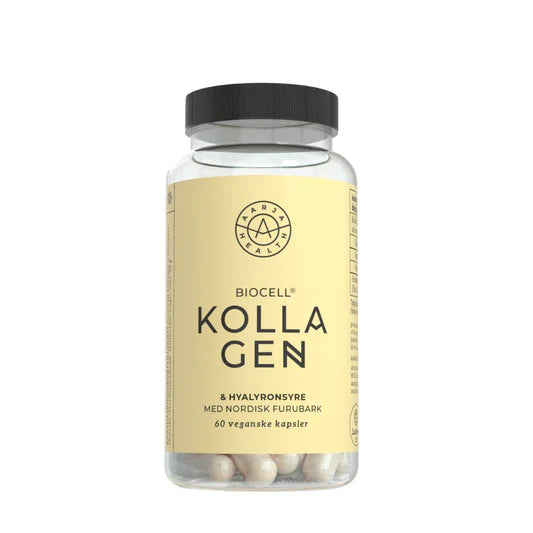
The benefits of B vitamins (and why we need them every day)
Do you feel tired all the time? Do you have difficulty concentrating? Do you find it difficult to keep up with the daily pace? Then it could be that you suffer from a B12 deficiency! In this blog post, I, Diego Nazar, product developer at Aarja Health will write about what B vitamins are and why you should take them daily.
B vitamins are a group of water-soluble vitamins that play an important role in metabolism, energy production and the functioning of the nervous system. There are a total of eight B vitamins: thiamin (B1), riboflavin (B2), niacin (B3), pantothenic acid (B5), pyridoxine (B6), biotin (B7), folate (B9) and cobalamin (B12).
While all B vitamins are important, some are better known than others. Vitamin B12, for example, is essential for red blood cell formation and DNA synthesis. Vitamin B6 is involved in over 100 enzymatic reactions in the body and is necessary for protein metabolism, immune defense and cognitive development. And folate (or folic acid) is especially important for pregnant women because it helps prevent birth defects.
Why should we take B vitamins?
As we age, the body becomes less efficient at absorbing nutrients from food. This means we need to supplement our diet with vitamins and minerals to ensure we get everything we need. B vitamins are no exception. In fact, research shows that up to 40% of adults over the age of 50 have insufficient levels of vitamin B12 in their blood.
What is vitamin B12?
Vitamin B12 is probably the best known B vitamin and is an important nutrient that helps keep red blood cells healthy and the nervous system working properly.
Symptoms of B12 deficiency
One of the most common symptoms of Vitamin B12 deficiency is fatigue. If you are constantly tired and have trouble getting out of bed in the morning, you may have a B12 deficiency. Other common symptoms are weakness, dizziness, difficulty concentrating, memory problems and mood swings. If you experience any of these symptoms, it is important to visit the doctor for a blood test and to check your vitamin B12 levels.
Treatment of B12 deficiency
If you are diagnosed with B12 deficiency, treatment is relatively simple. Your doctor will likely recommend that you take a daily supplement or receive regular injections of vitamin B12 . With treatment, most people begin to feel better within a few weeks. However, it is important to continue taking supplements or getting injections even after you start to feel better, to prevent levels from falling again.
Vitamin B6
Vitamin B6 is an essential nutrient that the human body needs to function properly. Vitamin B6 is also known as pyridoxine and is found in a variety of foods, including meat, poultry, fish, potatoes and starchy vegetables. This water-soluble vitamin plays an important role in many biochemical reactions in the body and has a wide range of health benefits.
Vitamin B6 is also involved in the synthesis of amino acids, which are the building blocks of proteins. It also helps metabolize carbohydrates and fats. Vitamin B6 is required for more than 100 enzymes involved in protein metabolism.
Vitamin B6 is important for a healthy immune system. It helps the body produce antibodies and red blood cells. Red blood cells transport oxygen to various tissues and organs in the body. Antibodies help the body fight infections by identifying and destroying foreign invaders such as bacteria and viruses.
Vitamin B6 is important for nerve cell communication. It helps maintain healthy levels of GABA, a neurotransmitter that plays a role in regulating mood and supporting healthy sleep patterns. Vitamin B6 also helps produce serotonin, another neurotransmitter that regulates mood, appetite and sleep.
Vitamin B9 – The forgotten vitamin
B9, or better known as Folacin, is a water-soluble vitamin found mainly in green vegetables and fruits. It was first discovered in the 1930s, and its name comes from the Latin word "folium" meaning leaf. This vitamin plays an important role in DNA synthesis, repair and methylation. B9 deficiency can lead to megaloblastic anemia, neural tube defects, and cardiovascular disease. So why is it often called the forgotten vitamin?
Vitamin B9 was once thought to be just a single nutrient, but we now know that it is actually a group of compounds called folates. Although the body cannot produce folates, they are important for many of our body functions. Unfortunately, due to modern diets and food processing methods, many people do not get enough folate through their diet.
So what are the best sources of vitamin B9? Here are some you will see some with a high content of vitamin B:
- Green leafy vegetables: spinach, kale, romaine lettuce, kale
- Broccoli
- Asparagus
- Brussels sprouts
- Avocado
- Beans and lentils
- Citrus fruits: oranges, lemons, grapefruit
- Fortified cereals and bread
Many people believe that vitamins are essential for good health, but few know much about them beyond their names and what difference they make in the body. Vitamin B9 is a typical such nutrient that is often overlooked, but plays an important role in our body. Hopefully this blog post has helped shed some light on this important but often forgotten vitamin.
If you're looking for a way to boost your energy levels, mood, and overall health, I highly recommend adding B vitamins to your daily routine. Trust me - once you start taking them, you won't want to go back to your old routine!





